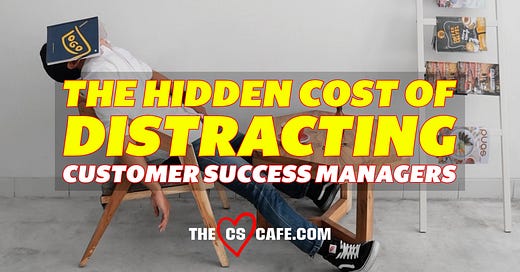The Real Reason CSMs Can't Get Stuff Done
Customer Success Managers play an important role.
That is to make sure customers are successful with the company’s products or services.
So far, so good.
But the problem is they often get pulled into doing tasks that have nothing to do with their main purpose.
This takes away time they should spend driving adoption, retention, and expansion—the core aspects of what customer success is.
Common Side Tasks CSMs Get Stuck With
One of the biggest time wasters for CSMs is dealing with support tickets.
Some CSMs handle 100+ support requests per month!
This leaves little time for working with customers on strategic initiatives like preventing churn.
See also these customer success fundamentals and strategies.
Another task that gets dumped on CSMs is the training and development of new employees.
Helping with their onboarding is necessary.
But it makes more sense for HR or training teams to handle it rather than customer success teams on the front line.
CSMs also get roped into:
Answering billing and payment questions
Coordinating between different departments like product and marketing
Doing administrative work like data entry or report creation
Attending meetings that don't involve customers
The list goes on and on.
With customer success teams getting pulled in so many different directions, it's no surprise their main job duties often get put aside.
Why Do CSMs Get These Random Tasks?
The main reasons are:
Unclear roles,
not enough staff,
and other teams pushing their unwanted work onto customer success.
As Rav Dhaliwal mentioned in his blog post and also on my podcast:
Many companies still consider Customer Success as "the everything department”.
Cross-team collaboration is normal and healthy.
But CSMs often get much more random responsibilities than they should.
The Revenue Cost of Distracting CSMs
The examples above show common tasks that distract CSMs from their main job.
But the bigger issue is how these distractions can affect metrics and revenue numbers.
Research has found that when CSMs spend too much time on side tasks unrelated to their core role, it can lead to:
More Customers Cancellations
Dealing with these extra activities leaves little time to engage with customers proactively.
This can result in higher cancellation rates.
Less Revenue from Expansion
When CSMs can't focus on adoption and value, those customers are less likely to expand their relationships.
This goes against what customers expect from their CSM in driving success.
It can ultimately lead to drops in revenue from upsells and cross-sells.
Lower Customer Satisfaction Scores
The drag on operations from excessive side tasks also hurts customer sentiment.
When CSMs waste their time on these side tasks, customer satisfaction scores or NPS might also get a hit.
Check out these customer success tips to avoid it.
These trends show why it's so important for companies to protect their CSMs' time.
Even small distractions can hurt customer retention and growth from existing customers.
This means less potential revenue when multiplied across all customers.
How to Let CSMs Focus on Customers
To fix this, companies should:
Define and make it clear what the CSM's role and duties are as highlighted in my interview with Kevin Herrholtz, Vice President of Customer Success at AddShoppers.
Hire enough staff for support, training, admin, etc. so CSMs don't have to fill those gaps.
Create solid workflows so CSMs don't have to be the go-between for customers and other teams as outlined in my guide to CSM introduction and best practices.
And That’s It
Addressing these issues will help organizations empower their CSMs to focus on their primary role.
That is to drive success for their customers and boost revenue growth for the company.
I hope that helps.
-Hakan.
What other side tasks are distracting you and impacting your productivity as a CS pro?
P.S. If you’re new to Customer Success, you can also check out my new book on tips for transitioning into customer success.



